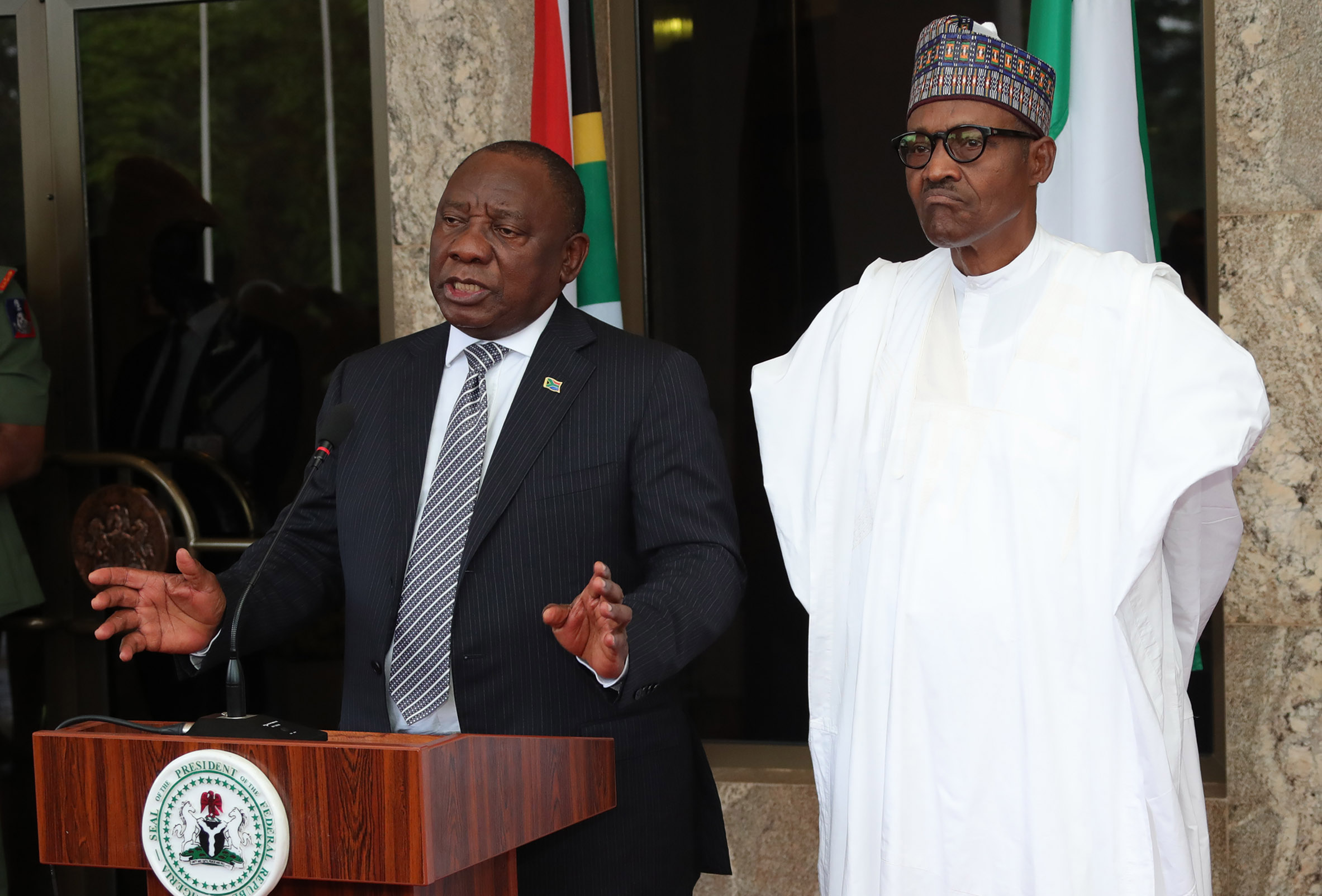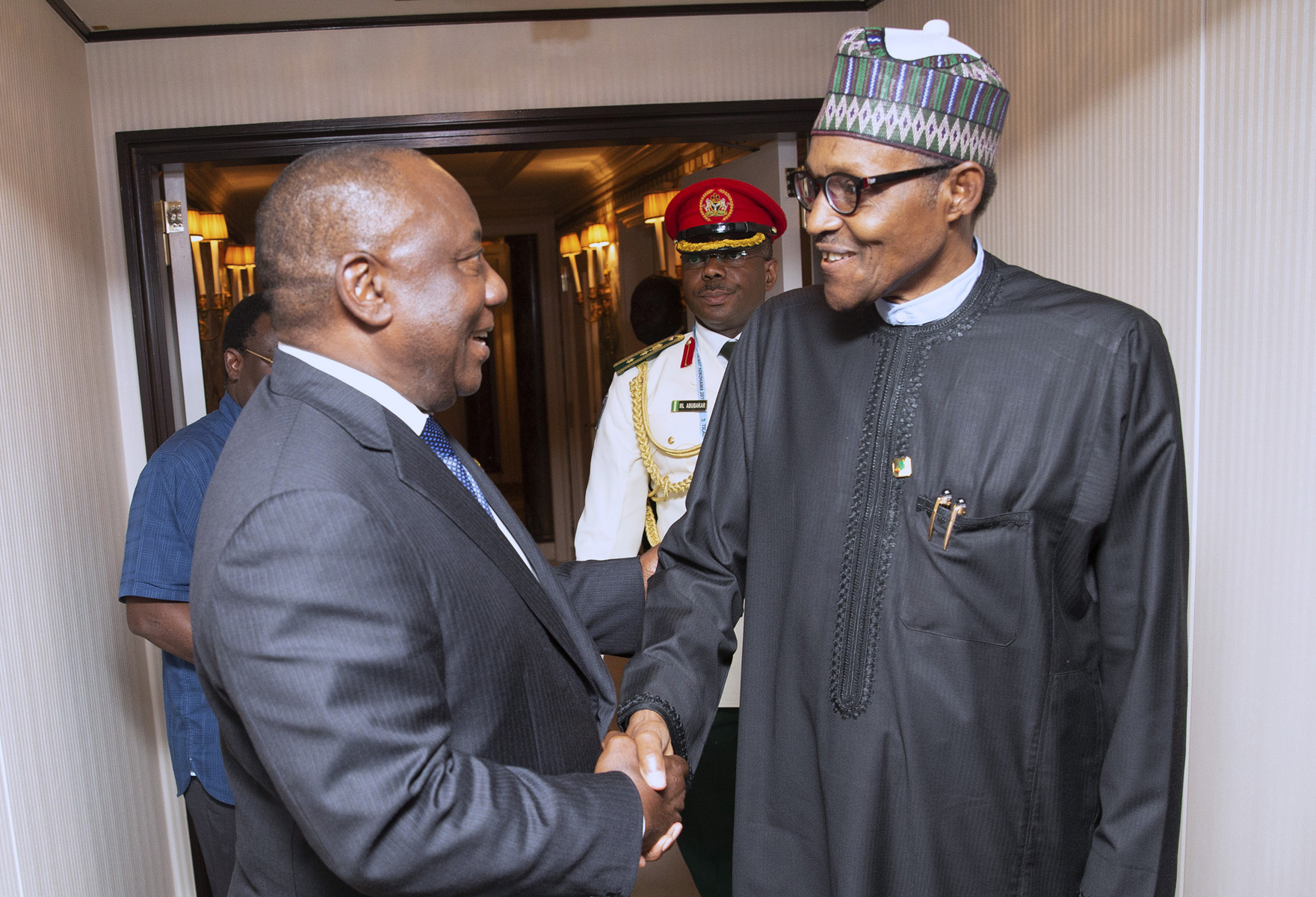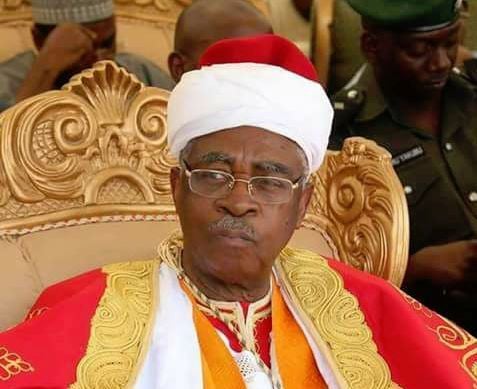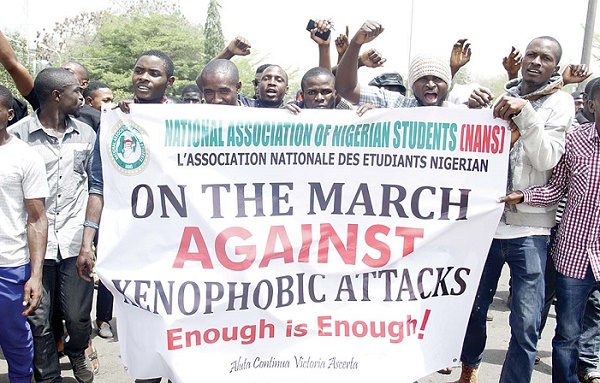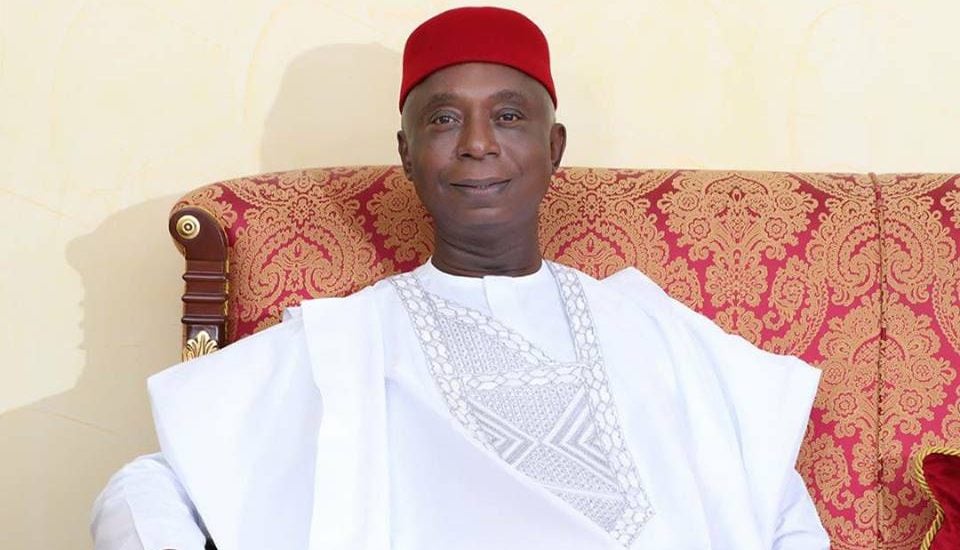PRESIDENT BUHARI RECEIVES SA PRESIDENT RAMAPHOSA 4A. PRESS BRIEFING R-L; President Muhammadu Buharichats with the President of South Africa, Mr Cyril Ramaphosa during an audience with President Buhari at the State House Abuja. PHOTO; SUNDAY AGHAEZE. JULY 11 2018.
In the year 1990 or thereabout, at the University of Lagos – trust students and their creative inclinations – we named some folks Umqombothi. They were students on exchange programme from Apartheid South Africa. The name sounded pejorative but that was all we could dream up to capture those young ladies who wagged their big mid-body members in very provocative swings down the sidewalks of the university. They usually got drunk, especially in the evenings.
This, they visibly demonstrated through the way they tottered, their eyes bloodshot and their liquor-jerked-high accents calling attention to them. Some mischievous student colleagues attributed the drunkenness to their under-estimation of the Nigerian lager, said to contain far more liquor than an average Umqombothi, the ignorance of which made the folks consume the lager in large quantity. Umqombothi is a Xhosa and Zulu home-made local beer with low alcohol content and is made from corn, maize malt, sorghum malt, yeast and water.
Umqombothi was the title of that popular song sung by Yvonne Chaka Chaka, one of the most famous songstresses ever to emerge from South Africa. Nigerians fell in love with the song which, apart from the matronly and ululating songs of Mama Africa, Miriam Makeba and Hughes Mazikela, was one of the most enthralling songs ever to come from Nelson Mandela’s country. So we called those folks Umqombothi, in admiration of Yvonne, the songstress heroine and our perceived consanguinity with our brethren in South Africa. This writer was also a fan of Brenda Fassie – that young South African lady pop star who lit her candle in the wind and got it extinguished by her heavy consumption of hard drugs.
Hide original message
Advertisement
I fell in love with South African literature early in life, reading up heroic travails of liberation struggle fighters and works of Mazisi Kunene, Ezekiel Mphalele, Peter Abrahams, Alf Wannenburg and many others. We longed to see Mandela released from jail and gobbled, like greedy gluttons, literature on his travails. When history told us how Nigeria contributed immensely to the liberation struggle in South Africa and offered asylum to many of the fighters, we felt very proud of our country and leaders like Prime Minister Tafawa Balewa, Generals Yakubu Gowon, Murtala Muhammed and Olusegun Obasanjo.
While we understood why Mandela had to go after the jugular of dictator Sani Abacha, Nigeria couldn’t reconcile why violence against Nigerians and other black Africans nationals should become almost a South African foreign policy. Since about 2015, a bloody wave of attacks against blacks stirred up unprovoked. The widespread hate at this time was shot up by derisive racial remarks by the Zulu King, Goodwill Zwelithini, which stoked the fire of resentment against the black population in the country. The major complaint of the attackers against other nationals is that they had upper hands in job placements and were the hub of crime. Nigerians resident in South Africa are held to be in the majority, especially those living in an area called Hillbrow in Johannesburg. Other areas most affected by the anger of the locals who easily become victims of this hatred are said to be the North West Province of Brits and the Kwazulu-Natal province of Durban. A few years ago, three Nigerians were shot dead at Sands Hotel Area of Berea in Johannesburg, one of them critically injured.
Last week’s assaults on Nigerians in South Africa where property worth billions in Nigerian Naira were set aflame seems to be the last straw in the relations between the two countries. Other countries who are victims of South Africans’ hate of other Africans have also begun a process of isolationism of the country. However, to understand this hate, we have to trace its genealogy so as to properly situate the kind of inner constitution that could make such infliction of horrendous pains on a fellow black a fait accompli for a South African national.
Advertisement
We cannot succeed in this psychological download of the mental constitution of an average South African unless we read my favourite short story, written by Daniel Canodoce, popularly known as Can Themba. Themba was a young Marabastad-born South African writer who died in 1968 at the age of 44. If the number of times citations are made of an artist’s work approximates the invocation of the spirits of the dead, this writer’s excessively frequent intrusion into Themba’s graveyard to cite his short story, The Dube Train, should have worn out his spirit.
Anyway, Themba, a drunk of renown, literary prodigy and journalist with the Drum, alongside Nat Nakasa, were one of South Africa’s journalists who blended journalism with creative writing. They were part of Black young writers of the Apartheid era who lived by the weird dictum, “Live fast, die young and have a good-looking corpse.” The narrator prefaces The Dube Train with a description of fellow commuters as “sour-smelling humanity” and exhibits his impatience with this “hostile life” and “the shoving savagery of the crowd.”
Deploying narratives, we are shown an early morning Dube township train coach going to Johannesburg with commuters therein. A girl is then viciously assaulted by a tout – tsotsi. A woman upbraids the men as cowards for allowing the tsotsi have such a field day without coming to her rescue. She had said: “Lord, you call yourselves men, you poltroons! You let a small ruffian insult you. Fancy, he grabs at a girl in front of you – might be your daughter – this thing with the manner of a pig! If there were real men here, they’d pull his pants off and give him such a leathering he’d never sit down for a week. But, no, you let him do this here; tonight you’ll let him do it in your homes. And all you do is whimper.”
The tsotsi pulls a knife as a muscular fellow commuter confronts him but the sudden jerk of the train deflects the knife and pierces the muscular man. All of a sudden, the stabbed man pulls the tsotsi and flings him out of the window, ostensibly to his death. With this, Themba explained the banality and ordinariness of death in the apartheid era. He ends the story by telling the readers that the murder of the tsotsi “was just another incident in the morning Dube Train” and the crowd “greedily relishing the thrilling episode.”
Advertisement
I have searched frantically for the lure of the gruesome murders of Nigerians and other African nationals by South Africans at the drop of a hat, the looting of their property and the animal instinct latent in these acts and my findings revealed a retained savagery of Apartheid. When you place stories of blood spillage under Apartheid with the recent ease with which South Africans hack fellow creations of God, knowledge of the country’s historical development will bail you out of wonderment. You may even conclude that Joseph Conrad of the Heart of Darkness fame may not be wrong after all or that, of a truth, the Blackman has innate bestiality resident in his gene, just like William Golding’s Lord of the flies says. You can convince anyone that the Blackman only needs very little provocation to unleash his ape ancestry of savagery, like those little boys marooned on an island whose animalism took the better part of them in the Golding classic, merely observing this black against black hate.
Apartheid brought out the beast in South Africans. The moment the system defoliated the Blackman’s manhood, he became a little less than an animal with no difference between his behavior and his ape ancestors. If you read the history of South African liberation struggle, it is replete with macabre and a number of horrendous murders that a civilized world would never condone. In the name of global struggle to eliminate Apartheid, many of those atrocities were excused and overlooked; indeed, they came to world knowledge seldom. The world focused, on the reverse, on the evil regime of Frederick de Clark and the atrocities of segregating white from Indians, black and coloured. The dastardly act of murdering fellow blacks who were perceived to have betrayed the liberation struggle in animally manner were never heard. Thus, we never knew how base and bloodless the hearts of our brothers were.
You will recall the trial of Winnie Mandela and the allegation of her involvement in the murder of some youths who went by the façade of a football club. The murdered boys were alleged to be squealing on the group and their liberation struggle. They were summarily tried by the “Winnie Boys,” sentenced to death and executed. This is one of the thousands of gruesome killings that Apartheid South Africa foisted on South Africans.
If you read some of the works of Alex la Guma, like A walk in the night, Quartet and In the fog of the seasons’ end, you will encounter the bestiality that Apartheid wrought on the psyche of our so-called brothers. Many black South Africans lost their humanity in the process and became a little higher in psyche than animals. In A walk in the night for instance, you will encounter District Six, a suburb of Johannesburg, home to all sorts of sub-human activities and why horrendous murder became part and parcel of the people’s existence. Mutual knifing, unprovoked arson, murders and all sorts were carried out with a clinical finish that will make a decent man shudder.
Advertisement
Umkhonto we Sizwe, the armed wing of the African National Congress, (ANC) founded by Mandela in 1961, perpetrated a lot of criminal activities and mindless murders that were swept under the rug while he was in jail. Several South Africans accused of betraying the struggle were tagged “cockroaches,” got summarily executed and nobody heard of their deaths till today.
The totality of the Apartheid experience has made crime to burrow into many South Africans which would be difficult to wean them from. This is why Nigerians retaliating by engaging in same mindless looting of South African investments as they did to our nationals, got it wrong. We have our drawbacks as a people but violence of the South African kind isn’t our constitution. If you see most of the killings in the fellow black hate drive, you would see a throw-back to the gruesome killings of Apartheid. It is inconceivable, but for the historical link to violence, for a people to blithely murder and destroy the businesses of Nigerians who spent over $60billion to fund the anti-Apartheid struggle, a Nigeria that hid Thabo Mbeki’s father from the lacerating anger of Apartheid, that offered Mandela refuge from Apartheid, helped fund Umkhonto we Sizwe and which gave support to an Apartheid government-harangued Albert Luthuli, who took over from Mandela, after he publicly burnt his Pass following the Sharpeville massacre.
Advertisement
As an aside, what exactly is Nigeria’s foreign policy thrust under the present government? Those days, we operated an Afrocentric foreign policy. I doubt if there is any now. Our foreign policy should be Nigerians-centric. It is good news that President Muhammadu Buhari, in the last few days, over the South African macabre, is now rising up to offer soothing embrace to Nigerians harangued abroad. What we used to have largely was a Nigeria that turned cold shoulders to citizens in distress. The bitter experiences of our nationals in South Africa should also impress it on us that it is imperative we make Nigeria worthy to live in.
Though they are said to be expressing their economic frustration and nationalism, ostensibly, South Africans are aware of the falling living standard and worsening economy that lead Nigerians to the survivalist strategy of seeking greener pastures in every other country but their home. We owe it a duty to both ourselves and country that Nigeria too becomes a pleasant country which travelling out of would be for mere sight-seeing, rather than for economic liberation. The hopelessness at home and the serial plunder of our country by our own kin, the notoriety of which is a tale told in all the four corners of the globe, are reasons why we weigh little in the estimation of the world. Again, the criminal lifestyles and drug-pushing that our nationals live abroad cannot but make any individual or sane government shudder. Let Nigerians live right and vote in right governments and we will reclaim our place of pride.
Advertisement
Views expressed by contributors are strictly personal and not of TheCable.
Add a comment

